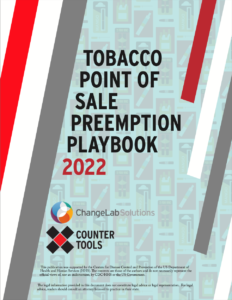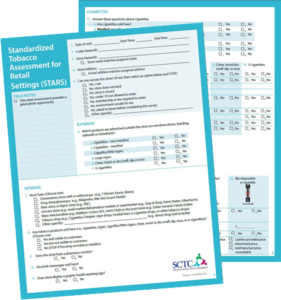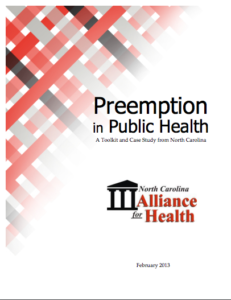Tobacco Point of Sale Preemption
What is Preemption?
Preemption means that the authority of one level of government to regulate an issue is limited by a higher level of government. For example, when local municipal or county governments want to pass legislation to enact or strengthen tobacco retail licensing requirements, a state law may prevent them from legally doing so. Similarly, a state law may be preempted by a federal law.
The Preemption Problem
Local governments are uniquely positioned to meet the needs of the people in their communities. Local level policy-making is an effective way to reduce tobacco use through strategies that are aligned with the local community’s needs, context, and values. Local level innovation often also spurs state-level action. Consequently, Big Tobacco works tirelessly to limit local control by lobbying for federal and state policy that includes language to prohibit local governments from enacting policies that are more stringent than the policy rules or regulations at the federal or state level. This type of preemption produces problems for local tobacco advocates who recognize that state and federal policy is often too broad to address the specific and unique needs of their community. Once preemption is in place, it can be difficult to overturn or reverse.
 Local governments often lead the way in adopting laws and policies to improve health outcomes and reduce inequities, including policies concerning tobacco in retail stores. However, state preemption can thwart local efforts to adopt laws and policies that protect public health and advance health equity. The Tobacco Point of Sale Preemption Playbook, a new resource from Counter Tools and ChangeLab Solutions, equips tobacco prevention staff and their partners with the knowledge, context, and resources needed to understand how preemption influences their work. In this resource, learn more about the different forms preemption can take, key steps and legal considerations for determining local authority, and strategies communities across the country are using to make progress despite preemption of local point-of-sale tobacco policies.
Local governments often lead the way in adopting laws and policies to improve health outcomes and reduce inequities, including policies concerning tobacco in retail stores. However, state preemption can thwart local efforts to adopt laws and policies that protect public health and advance health equity. The Tobacco Point of Sale Preemption Playbook, a new resource from Counter Tools and ChangeLab Solutions, equips tobacco prevention staff and their partners with the knowledge, context, and resources needed to understand how preemption influences their work. In this resource, learn more about the different forms preemption can take, key steps and legal considerations for determining local authority, and strategies communities across the country are using to make progress despite preemption of local point-of-sale tobacco policies.
How would a state know if they are preempted?
- CDC’s State Tobacco Activities Tracking and Evaluation (STATE) System database
- American Lung Association’s State Legislated Actions on Tobacco Issues (SLATI) database
- Legal analyses from legal technical assistance providers (e.g. Public Health Law Center or ChangeLab Solutions)
- Assessing state tobacco laws and legal treatises
- State Attorney General opinions
- Guidance from municipal leagues (e.g. National League of Cities, National Association of Counties, state municipal leagues)
What can states or localities that are preempted at the Point of Sale do?
- Meet with a legal technical assistance provider who can conduct help survey existing resources and legal analyses, understand the general scope local authority, and assess the commercial tobacco point-of-sale preemption landscape to determine or clarify the preemption your community may be facing.
 Leverage point of sale activities to move forward on other tobacco control issues such as raising excise taxes, securing program funding, or strengthening smoke-free laws. These activities could include:
Leverage point of sale activities to move forward on other tobacco control issues such as raising excise taxes, securing program funding, or strengthening smoke-free laws. These activities could include:
- Engaging communities in store mapping and store assessments (e.g. by using STARS, CounterTobacco.org’s Youth and Community Engagement Activities, or Counter Tools to show community members what is happening with tobacco sales and marketing at their local stores.
- Evaluating retailers for compliance under the Master Settlement Agreement, FDA Inspections, Synar, or Assurances of Voluntary Compliance (AVCs).
- Creating retailer incentives or “healthy retail” programs. Some communities that are preempted choose to work with retailers on an individual basis, asking the stores to take voluntary steps to reduce the dominance of tobacco in the retail space, such as removing or reducing tobacco advertising and moving tobacco products out of the reach of youth. Learn more about healthy retail programs, policies, and practices.
- Consider alternative, non-preemption point-of-sale policies that may accomplish the same or similar goals (e.g. exploring zoning restricting instead of licensing)
- Move forward despite clear or potential preemption. This may create an opportunity to challenge the validity of state preemption and draw public attention to the consequences of such preemption. Whether and how to adopt this strategy depends on the acceptable level of risk for your jurisdiction, whether punitive preemption is in place, and the broader context and political landscape. Especially important in these cases is drafting policies with litigation in mind and to prepare fo potential legal challenges. Jurisdictions can also consider incremental point-of-sale policies to lay the foundation for future policy change. Read more on pg. 21 of the Point-of-Sale Preemption Playbook.
Preventing and Undoing Preemption
- Learn more about preemption and how it harms public health and equity. This includes understanding the different forms of preemption and ways in which it operates, the current landscape of preemption in commercial tobacco control and other policy areas, the stakeholders supporting and opposing preemption, and the body of research assessing the effects of preemption on public health and health equity.
- Form a coalition of key stakeholders. The coalition can set goals and determine coordinated strategies for working together on both making progress under preemption in the short-term and restoring local authority in the longer term.
- Engage with communities about preemption and how it has affected them. Many community members may be unaware of what preemption is, why it’s important, how it’s been misused, and how it takes power and voice away from local communities. Tobacco control professionals can help fill this gap through education and capacity building assistance. At the same time, tobacco control professionals should strive to understand people’s lived experience and how preemption has directly affected them and their communities. These stories can create a powerful narrative about the importance of giving power back to communities by reversing preemption.When engaging communities, tobacco control professionals should remain cognizant that communities that have experienced discrimination and marginalization at the hands of local government may view preemption through a different lens—one in which preemptive state laws, such as civil rights laws, acted as a counterweight to harmful local laws and policies. In these instances, it is critical to distinguish between these limited instances in which state preemption acts to prevent inequities with the much more common use of preemption, including in the commercial tobacco context, to undermine health- and equity-promoting local policies.
- Build the evidence-base and political support for reversing preemption. Monitoring and documenting youth tobacco use trends as well as retail sales to underage youth violations can help make the case for the need to implement best practices, such as ensuring local authority to adopt more protective prevention laws.
- Example: Some communities have also sought to build support for reversing preemption by having local governments adopt resolutions requesting local authority. For example, several county Boards of Health in North Carolina have passed such resolutions (Orange, Durham, Pitt, Cumberland, Chatham, Rutherford-Polk-McDowell, and Henderson), requesting the authority to raise the minimum legal sales age for tobacco to 21.
- Educate stakeholders and decision makers about the harms of preemption and counter preemption myths, including by sharing:
- Information about the importance of preserving local government’s ability to adopt point-of-sale policies tailored to the needs of their community,
- Stories about the real-world effects of preemption on communities,
- Empirical evidence demonstrating the concrete harms that result from state preemption,
- Examples of how state preemption laws stifle progress at the local level that could protect communities from Big Tobacco
- This toolkit from ChangeLab Solutions and resource from the Local Solutions Support Center offers bulleted takeaways and talking points about research on the effects of preemption on public health and equity.
- For information about lobbying limitations and alternatives, if you are a CDC funded entity, see:
- Use evidence-based messaging and frames in efforts to counter preemption. See the following resources:
- Preemption Campaign Toolkit, Voices for Healthy Kids
- Preemption Message Manual, Voices for Healthy Kids
- Preemption Case Studies, Voices for Healthy Kids
- Preemption Message Wheel, Voices for Healthy Kids
- Preemption Key Messaging, Voices for Healthy Kids
- Preemption One-Pagers, Voices for Healthy Kids
- Message Guide: State Preemption and the Effects of Limiting Local Power, Local Solutions Support Center
- Protecting Local Democracy: A Messaging and Research Toolkit
- Develop strategic partnerships through cross-issue coalitions committed to defending local democracy. Constant monitoring of legislation at the state level for any preemptive language can be a challenge. One strategy to help monitor and guard against preemption is to partner or form a coalition with advocacy groups from other sectors that also face preemption threats, such as groups working towards higher minimum wages, paid sick leave, anti-discrimination laws, laws that prevent gun violence, sugar-sweetened beverage taxes, and plastic bag or straw bans.For example, in Maryland, over 25 groups have banded together as Let Our Communities Act Locally (LOCAL Maryland).
- Partner with individuals and organizations who can support efforts to reverse preemption.
- Work towards state-level tobacco control progress. View this webinar on Moving Forward when Tobacco Preemption is in Effect from the Public Health Law Center and the Tobacco Control Network.
Undoing Preemption: Legal Pathways
- Lessons from Smoke-Free Air: A 2010 CDC Report mentions that there are three methods that have been successful in rescinding preemptive provisions on local smoke-free policies. The best practices discussed include:
- Legislation – Iowa, Louisiana, Mississippi, New Jersey, North Carolina, and Oregon were able to rescind preemption as part of new legislations that restricted smoking in specific places. Louisiana and New Jersey included specific language in their legislation that explicitly gave communities the ability to create their own smoke-free policies, while Iowa and Oregon passed legislation that removed smoke-free preemption.
- Special cases in Rhode Island and Montana involved “sunset” clauses, where preemptive polices have a date where the policy expires and the preemption was no longer valid after the expiration date.
- Read more about repealing preemption and advancing non-preemptive language in state law
- Ballot Measure – Nevada rescinded their smoke free provision through a ballot measure in 2006, which prohibited smoking in certain public places by state law, but allowed counties, cities, and towns to adopt stricter measures, removing the barrier of preemption.
- Court Rulings – South Carolina Supreme Court ruled that state laws did not preempt local smoking restrictions, giving local communities clarity on their ability to enact smoke-free policies.
- Legislation – Iowa, Louisiana, Mississippi, New Jersey, North Carolina, and Oregon were able to rescind preemption as part of new legislations that restricted smoking in specific places. Louisiana and New Jersey included specific language in their legislation that explicitly gave communities the ability to create their own smoke-free policies, while Iowa and Oregon passed legislation that removed smoke-free preemption.
- Legal Strategy Process: Legal Preemption and the Prevention of Chronic Conditions
- Litigation: Litigation can be used to proactively challenge new or existing preemption laws, for example, on the grounds that it violations the locality’s home rule authority or that the state legislature violated procedural requirements when adopting the preemption law. A locality may also actively seek to draw a lawsuit by adopting a preempted or potentially preempted point-of-sale policy knowing that the policy is likely to be challenged and use the subsequent litigation to challenge the validity of the preemption law. See the Public Health Law Center’s resource Untangling the Preemption Doctrine in Tobacco Control for more information.
Preemption Case Studies
Preemption is one of the biggest challenges in tobacco control and can impede policy change. However, reversing preemption is possible! During this webinar, part of Counter Tools’ Healthy POS Webinar Series, we discuss Colorado’s experience with preemption and efforts made to advance policy within the state. Colorado state law previously stated that “…In order to qualify for distribution of state income tax moneys, units of local government are prohibited from imposing fees, licenses, or taxes on any person as a condition for engaging in the business of selling cigarettes or from attempting in any manner to impose a tax on cigarettes.” This preventing localities from licensing cigarettes retailers or imposing their own cigarette taxes. However, this law was reversed in 2019. This webinar explores local-level case studies and the statewide work that led to reversing preemption. Speakers include:
- Mandy Ivanov, Health Promotion Coordinator with Eagle County Public Health and Environment
- Jodi Radke, Regional Director at the Campaign for Tobacco Free Kids
- Jill Bednare, Tobacco Policy Initiatives Supervisor at the Colorado Department of Health and Environment
- Moderator: Jackie Boards, Project Director at Counter Tools
Download the slides here and view the recording here or below:
With the introduction of new preemption bills during the pandemic and existing preempted states, tobacco point-of-sale related preemption presents a challenge to policy action and local control. The speakers for this webinar, part of Counter Tools’ Healthy Point of Sale Webinar Series, talk about how preemption operates using the newly-released Tobacco Point of Sale Preemption Playbook and give insights from a state and local-level of ways to navigate it. This webinar equips attendees with information on the basis of preemption using a legal perspective, provides ways of how to respond to preemption, and gives examples of fighting back, such as with local-level community engagement. If you’re interested in learning more about preemption from a tobacco point-of-sale perspective and want to hear from a preempted state, this is the webinar for you!
Speakers:
- Sara Bartel, Senior Attorney, ChangeLab Solutions
- Nancy Cripe, Director/Coalition Coordinator, Tobacco Free Allen County (Indiana)
- Brandy Paul, Tobacco Epidemiologist, Indiana Department of Health – Tobacco Prevention and Cessation Commission
Download the slides here and view the recording here or below:
Resources:
- Tobacco Preemption Resources
- Why Preemption Matters for Tobacco Control, Public Health Law Center
- Untangling The Preemption Doctrine in Tobacco Control, Public Health Law Center
- Preemption Fact Sheet, CDC State Tobacco Activities Tracking and Evaluation (STATE) System
- State Legislated Actions on Tobacco Issues (SLATI), American Lung Association
- Protect Local Control, Americans for Nonsmokers’ Rights (includes interactive and informational resources that track smoke-free activity by state and Preemption Watch Bill Tracking Summary)
- General Preemption Resources:
- Dillon’s Rule, Home Rule, and Preemption, Public Health Law Center
- Assessing and Addressing Preemption: A toolkit for local policy campaigns, ChangeLab Solutions
- Understanding Preemption: A Fact Sheet Series, ChangeLab Solutions
- The Consequences of Preemption for Public Health & Equity, ChangeLab Solutions
- Fundamentals of Preemption, ChangeLab Solutions
- Webinar: Preemption, Public Health, and Equity: The Search for Local Solutions, ChangeLab Solutions
- Preemption: What It Is, How It Works, and Why It Matters for Public Health, ChangeLab Solutions
- Preemption and Public Health Facilitator’s resources, ChangeLab Solutions
- Preemption & Public Health Training, Public Health Law Academy (ChangeLab Solutions)
- At-A-Glance: Research on Preemption, Public Health, and Equity, ChangeLab Solutions and Local Solutions Support Center
- City Rights in an Era of Preemption: A State-by-State Analysis, National League of Cities Center for City Solutions’
- Webinar: Federal and State Preemption Basics: What every drafter ought to know, National Council on State Legislatures
- Preemption Watch Tools, Grassroots Change
- Combatting preemption: Myths and facts, Grassroots Change
- Webinar: Municipal Issues in an Era of Preemption, Stateside
- Messaging:
- Preemption Message Manual, Voices for Healthy Kids
- Preemption Creative Toolkit, Voices for Healthy Kids
- Preemption Key Messaging, Voices for Healthy Kids
- Preemption Message Wheel, Voices for Healthy Kids
- Connecting the Dots: How to Message the Abuse of State Preemption, Local Solutions Support Center
- Talking About Preemption to Different Audiences, Local Solutions Support Center
- Organizations Working on Preemption
- Local Solutions Support Center: a coordinating hub that provides local governments, elected officials and advocates with the strategies, tools and assistance needed to defend local democracy and discourage the use of preemption that limits the ability of cities to protect people’s civil rights, solve problems, and improve lives. See two of their resources below:
- American Heart Association
- Voices for Healthy Kids
- National League of Cities
- Nationals Association of Counties
- Local Municipal Leagues
- Federal Preemption
- Not for Sale: State Authority to End Cigarette Sales, Mitchell-Hamline Law Review
- Pertschuk M, Pomeranz JL, Ralston JR, Larkin MA, & Paloma M. (2012). Assessing the Impact of Federal and State Preemption in Public Health: A Framework for Decision Makers. Journal of Public Health Management Practice. doi: 10.1097/PHH.0b013e3182582a57
- Empowering State and Local Regulation of Tobacco and Nicotine Products to Protect Youth, JAMA Health Forum
- Permissible State Restrictions on Tobacco Product Marketing: What Can States Do Given the 1st Amendment (and Federal Preemption)?, Campaign for Tobacco-Free Kids



